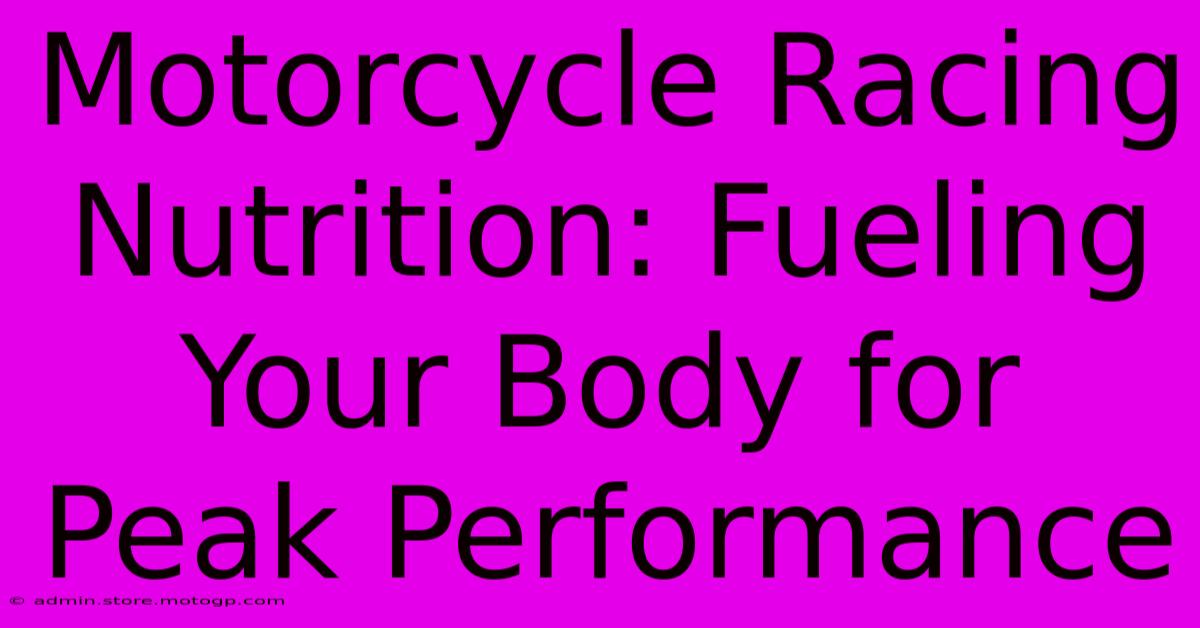Motorcycle Racing Nutrition: Fueling Your Body For Peak Performance

Table of Contents
Motorcycle Racing Nutrition: Fueling Your Body for Peak Performance
Motorcycle racing demands peak physical and mental performance. It's a grueling sport requiring intense bursts of energy, unwavering focus, and rapid reaction times. While skill and training are crucial, your nutrition plays a pivotal role in achieving your best results. This guide explores the essential aspects of motorcycle racing nutrition, helping you fuel your body for optimal performance and recovery.
Understanding Your Nutritional Needs
Motorcycle racing is unique in its demands. Unlike endurance sports with consistent energy expenditure, racing involves intense spurts of activity interspersed with periods of relative rest. This requires a nutritional strategy that addresses both immediate energy needs and long-term recovery. Your diet should focus on:
1. Carbohydrates: Your Primary Fuel Source
Carbohydrates are your body's primary energy source, especially during intense races. Focus on complex carbohydrates like:
- Whole grains: Brown rice, quinoa, oats provide sustained energy release.
- Fruits and vegetables: Packed with vitamins, minerals, and fiber.
- Sweet potatoes: A great source of complex carbohydrates and vitamin A.
Avoid simple sugars, which cause rapid energy spikes and crashes.
2. Proteins: Building and Repairing Muscle
Protein is essential for muscle repair and growth, crucial after strenuous races. Include lean protein sources in your diet:
- Lean meats: Chicken, turkey, fish.
- Legumes: Lentils, beans, chickpeas.
- Eggs: A complete protein source.
- Greek yogurt: High in protein and calcium.
Adequate protein intake ensures muscle recovery and reduces the risk of injury.
3. Healthy Fats: Essential for Hormone Production and Brain Function
Healthy fats are vital for hormone production, brain function, and nutrient absorption. Incorporate sources like:
- Avocados: Rich in monounsaturated fats and fiber.
- Nuts and seeds: Provide healthy fats, protein, and fiber.
- Olive oil: A source of monounsaturated fats.
Avoid saturated and trans fats, which can negatively impact health and performance.
4. Hydration: The Cornerstone of Performance
Dehydration significantly impacts performance, leading to fatigue, reduced concentration, and increased risk of cramps. Maintain optimal hydration by:
- Drinking water throughout the day: Don't wait until you're thirsty.
- Electrolyte drinks: Replenish electrolytes lost through sweat, especially during long races.
- Water-rich fruits and vegetables: Contribute to your daily fluid intake.
Pre-Race, During-Race, and Post-Race Nutrition
Your nutritional strategy should adapt to the different phases of racing:
Pre-Race Nutrition: Fueling Your Body for the Challenge
The pre-race meal should be easily digestible and provide sustained energy. Avoid high-fiber foods or anything that might cause digestive upset. A good option might be oatmeal with fruit or toast with a thin layer of nut butter.
During-Race Nutrition: Maintaining Energy Levels
During longer races, consider easily digestible carbohydrate sources like energy gels or chews to maintain energy levels. Electrolyte drinks are essential for hydration.
Post-Race Nutrition: Recovery and Repair
Post-race nutrition focuses on replenishing glycogen stores and facilitating muscle repair. Consume a combination of carbohydrates and protein within 30-60 minutes of finishing the race. A protein shake with fruit is a good option.
Supplements: Consideration and Caution
While a balanced diet is paramount, some supplements might be beneficial. However, always consult with a sports nutritionist or doctor before incorporating any supplements into your regimen.
The Importance of Sleep and Stress Management
Nutrition is only one piece of the puzzle. Adequate sleep and stress management techniques are also crucial for optimizing performance. Aim for 7-9 hours of quality sleep each night and incorporate stress-reducing activities into your routine.
Conclusion: A Holistic Approach to Peak Performance
Motorcycle racing demands a holistic approach to optimize performance. By focusing on a well-planned nutrition strategy, incorporating adequate hydration, prioritizing recovery, and managing stress, you can unlock your full potential on the track. Remember that individual needs vary, so consulting with a sports nutritionist or registered dietitian can provide personalized guidance tailored to your specific requirements and goals.

Thank you for visiting our website wich cover about Motorcycle Racing Nutrition: Fueling Your Body For Peak Performance. We hope the information provided has been useful to you. Feel free to contact us if you have any questions or need further assistance. See you next time and dont miss to bookmark.
Featured Posts
-
Experience Moto Gp Like Never Before Live Stream Free
Feb 17, 2025
-
Unleash Your Potential Moto Gp Motorcycle Available
Feb 17, 2025
-
Uncover The Power Of Cota Lot H
Feb 17, 2025
-
F1 Austin The Hottest Ticket In Town
Feb 17, 2025
-
Cutting Edge Racing Technology Motorcycles
Feb 17, 2025
